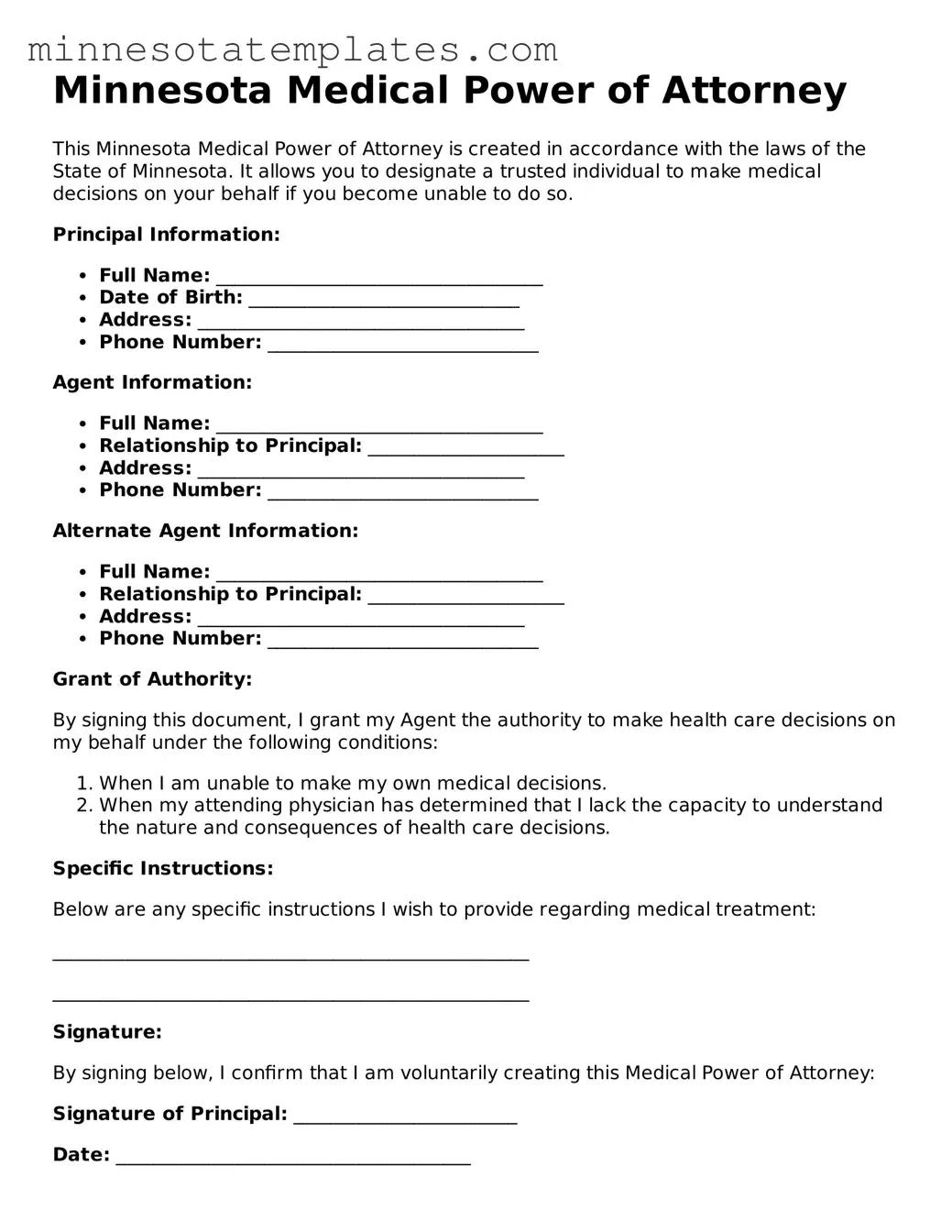Valid Medical Power of Attorney Form for the State of Minnesota
In Minnesota, the Medical Power of Attorney form plays a crucial role in ensuring that your healthcare preferences are respected when you are unable to communicate them yourself. This legal document allows you to appoint a trusted individual, often referred to as your agent, to make medical decisions on your behalf. It is essential to choose someone who understands your values and wishes regarding medical treatment. The form covers various aspects, including the types of medical procedures you would or would not want, the authority granted to your agent, and any specific instructions you wish to include. By completing this form, you not only empower your agent to act in your best interest but also provide peace of mind for both yourself and your loved ones. Understanding the nuances of this document can help ensure that your healthcare decisions align with your personal beliefs and preferences, making it a vital part of any comprehensive estate plan.
Key takeaways
Filling out a Medical Power of Attorney (MPOA) form in Minnesota is an important step in ensuring that your healthcare wishes are respected when you cannot speak for yourself. Here are some key takeaways to keep in mind:
- The MPOA allows you to appoint someone you trust to make medical decisions on your behalf.
- Your appointed agent should be someone who understands your values and wishes regarding healthcare.
- In Minnesota, the MPOA form does not need to be notarized, but it must be signed in the presence of two witnesses.
- Witnesses cannot be your agent, your healthcare provider, or anyone who stands to inherit from you.
- It’s essential to discuss your healthcare preferences with your agent before completing the form.
- You can specify the types of medical treatments you do or do not want in the MPOA.
- The MPOA remains effective even if you become incapacitated, ensuring your wishes are followed.
- Review and update your MPOA regularly, especially after significant life changes.
- Provide copies of the signed MPOA to your healthcare providers and your agent.
- Remember that you can revoke the MPOA at any time, as long as you are mentally competent.
Taking these steps can help ensure that your medical decisions align with your personal values and preferences, providing peace of mind for you and your loved ones.
Misconceptions
Understanding the Minnesota Medical Power of Attorney form is crucial for individuals seeking to ensure their healthcare preferences are honored. However, several misconceptions exist regarding this important document. Below are six common misconceptions, along with clarifications for each.
- Misconception 1: The Medical Power of Attorney is only for the elderly.
- Misconception 2: A Medical Power of Attorney is the same as a living will.
- Misconception 3: The appointed agent must be a family member.
- Misconception 4: The Medical Power of Attorney is only effective if I am incapacitated.
- Misconception 5: Once I fill out the form, I cannot change it.
- Misconception 6: My healthcare providers will automatically know about my Medical Power of Attorney.
This is not true. Anyone, regardless of age, can benefit from having a Medical Power of Attorney. Unexpected medical situations can arise at any time, making it essential for all adults to consider this form.
While both documents relate to healthcare decisions, they serve different purposes. A Medical Power of Attorney designates someone to make decisions on your behalf, while a living will outlines specific medical treatment preferences.
This is incorrect. Individuals can appoint anyone they trust as their agent, including friends or professionals, as long as that person is willing to take on the responsibility.
Although the primary function is to act when you are unable to make decisions, the document can also allow your agent to make decisions even when you are capable, if you choose to grant that authority.
This is false. You can revoke or modify your Medical Power of Attorney at any time, as long as you are mentally competent to do so. It is advisable to inform your agent and healthcare providers of any changes.
It is essential to communicate your wishes and provide copies of the document to your healthcare providers. They need to be aware of your designated agent to honor your preferences effectively.
Other Common Minnesota Templates
Minnesota Power of Attorney Form - Individuals can choose trusted family members or friends as their agents.
To effectively manage your vehicle transactions in Alabama, it is important to understand the importance of having a properly filled out Motor Vehicle Power of Attorney form, as this allows you to delegate authority for matters related to buying, selling, or registering vehicles.
Purchase Agreement Template Minnesota - It establishes deadlines for key actions, like closing dates.
